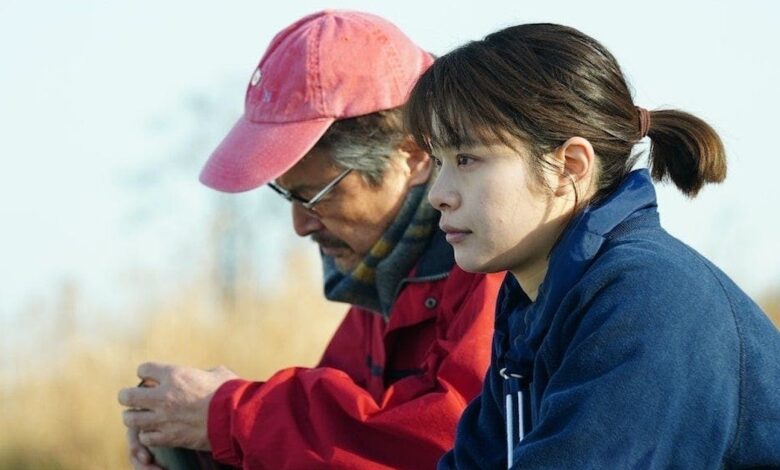‘Small, Slow but Steady’ Is a Quietly Moving Boxing Film

It’s a biopic that eschews the Wikipedia highlights. It’s a sports film whose training montage evokes bittersweet nostalgia instead of imminent victory (edited by Okawa Keiko). Miyake Sho’s Small, Slow but Steady (ケイコ 目を澄ませて, lit. “Keiko open your eyes” 2022), cowritten with Sakai Masaaki, is inspired by the memoirs of Ogasawara Keiko, a Deaf female boxer professionally active from 2010 to 2013. She’s not a champion, and her boxing achievements are few — the proprietor of her boxing gym (Miura Tomokazu) even criticizes her physical disadvantages in an interview that serves as the film’s only scene of backstory exposition. The director said he wanted to use his limited budget to make a different kind of sports film, one not motivated by an ideology of public triumph. The result is a quiet slice of life character study that reflects its protagonist’s inner turmoil in the growing isolation of the developing pandemic. It’s incredibly moving.
Kishii Yukino, who’s Hearing, plays Keiko at the tail end of 2020 after she has just won her first professional match by knockout. She trains every morning by the river and every evening at Tokyo’s oldest boxing gym; an early long take of her learning combinations with trainer Matsumoto (Matsuura Shinichiro) is spellbinding in its fluidity, and in how quickly Keiko picks up the pattern. The low and warm lighting, captured with mostly static shots in 16mm by Tsukinata Yuga, adds to the sense of tradition, authenticity, belonging, and riverside beauty. This is where Keiko’s in her element.
During the day, she works as a hotel cleaner, fast and efficient, but isolated from her non-Signing colleagues. Her boxing trainers don’t Sign, either, communicating by gesture and whiteboard. Perhaps Keiko chooses these activities because of their physicality and routine. At night, she lives with her younger brother (Sato Himi), a guitarist who sometimes invites his girlfriend over to sing (Nakahara Nana; the two previously played a couple in Moonlight Shadow). This tranquil introductory first act concludes with Keiko fighting a match, which she wins on points.
Then the bad news enters the ring. Keiko’s generally supportive mother (Nakajima Hiroko) can’t bear seeing her daughter hurt, a problem compounded by Keiko’s weak defense, and asks her to retire. The venerable gym won’t survive the pandemic-induced economic downturn. And the health of its beloved proprietor is failing, though not from Covid.
The pandemic poses particular problems for Keiko. Hearing, like sight, is a distance sense, and touch can be particularly important for Deaf people. Wearing masks impedes lip-reading, as highlighted at several points in the film. And without a crowd for her boxing matches, Keiko has fewer visual cues to help her notice when something happens, like when the boxing bell rings.
As her isolation deepens, the film draws us further into Keiko’s subjective interior, conveyed in large part through Kishii’s subdued yet intense performance; Keiko knows from long experience that not everything is worth the effort to communicate to people who don’t Sign, and so she keeps most things inside. She sometimes does this even to people who do Sign, as when her brother tries and fails to get her to share her worries. Particularly significant Signed dialogue is rendered with not subtitles but black and white intertitles, letting us focus on the performances before seeking to understand. But her life isn’t entirely hermetic: Late in the film, we see her having coffee with two Deaf friends, and their conversation isn’t translated (or so I’ve been told; there were Chinese subtitles).
Her mother’s overflowing worry leads Keiko to consider giving up her passion, and though she’s hardworking, aggressive, and scrappy as hell, she probably knows that she’s no Katie Taylor. In a very Japanese paradox, it’s the sacrifices made for her by her gym’s proprietor in the face of economic and medical peril that reignite her fighting spirit. And after she swallows defeat, the lightest of encouragements from a former opponent keeps her in the ring (metaphorically speaking).
Small, Slow but Steady is a French coproduction, but its script is the opposite of Gallic chattiness (unlike Kore-eda’s The Truth from 2019). Over the course of its 99 minutes, one learns to inhabit Keiko’s quietude, and even begins to feel the power that lies at its center.
Small, Slow but Steady is in theaters.
READ NEXT: ‘The Idol’ Ends Not with a Bang but a Whimper
TNL Editor: Kim Chan (@thenewslensintl)
If you enjoyed this article and want to receive more story updates in your news feed, please be sure to follow our Facebook.





